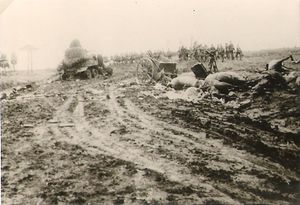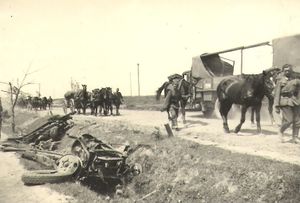9. August 1941
| GEO & MIL INFO | ||||
|---|---|---|---|---|
| Rest area of I.R.477 9–11 Aug Golowaniewsk–Alexandrowka–Schipilowka[1] | ||||
| 257th I.D. from 9 Aug planned as army reserve[2], from 12 Aug at the latest corps reserve[3] | ||||
In the next village[4] we move into resting quarters for three days. This is indeed necessary. I have hardly slept in the last four nights, and of course many comrades did the same. On the evening of the first day of rest, the company's noncommissioned officers organize a leisurely get-together. In the course of the evening, I realize that I am dead tired. Soon I realize that I have caught a cold. To make matters worse, I get diarrhea, which robs me of my fifth night's rest. It was cherry time, in fact, and I had cooked myself up a boiling pot full of sour cherries. Since I still had large quantities of loot sugar, I did not spare it. The success then was resounding.
This sugar came from a sugar factory that we once passed during our advance. It was not working, because a few days before our attack troops had rolled over this area. That's when we stocked up and packed as many sacks of sugar on the vehicles as could go up. Nobody wanted sugar anymore. The population had also helped themselves in abundance. When we left, I had to leave my own sugar sack (a hundredweight!) behind in the quarters. This particularly annoyed me, because the bitch of a landlady had been a spiteful beast.
The rest days were filled with the usual and necessary duties: Weapons and equipment cleaning, repairing things, inventories, roll calls, loss reports, sub-leader and chief meetings. In the process, there are again serious differences between the greybeard and the two company officers, who do not put up with his sometimes stupid orders. I, as Benjamin, stay out of it. The greybeard doesn't like me anyway, perhaps because I'm an academic. So this army boot of a boss has enough reasons for his dislike of me. I have felt this often enough. He doesn't like his lieutenants either, but they are officers he can't do anything to.
The Führerreserve is changed again, and the greybeard sends me off there. As I receive my marching rations in the kitchen and say goodbye, the kitchen sergeant tells me about a captain who was here the day before to look for the grave of his son killed in the battle. He had found it in the evening, sat down by the grave mound, and stayed there all night until our kitchen sergeant called him into quarters in the morning for a cup of coffee.
We drive to the division on a lorry.[5] The division Führerreserve has been enlarged. It now includes 50 officers, NCOs and enlisted men. The purpose of this unit is clear: to always have a reserve available in the face of inevitable casualties. In addition, new tasks have now been added which have proved necessary or expedient from previous experience in the advance. These include marshalling and routing the regiments' marching blocks through confusing wooded areas, at forks in the road, and on routes that are inaccurately marked on maps or not marked at all. Also traffic control at bridges, road crossings and through villages. In this way, the division's advance is to be saved from time-consuming stalemates. For these purposes the Führerreserve is divided into groups of two to four men, who quarter or camp near the point of traffic to be occupied and then channel the passing columns through. Once all the marching groups have passed, the group is quickly moved forward again on bicycles or lorries past the troops, where their task begins anew. We wear red armbands with the inscription "Stomarsch" (Staff Officer for March Supervision) and have the right to use any vehicle for our onward transportation and any field kitchen for our rations if our own vehicles cannot accomplish this task in time.
Today we are passing a column of Russian prisoners through the village. They come over a bridge and follow the road into the village. On both sides of the road are small wooden houses with front gardens. From one of these little houses a girl steps out with a bucket of water and offers the prisoners to drink. This makes a bit of a mess, but it doesn't matter. Only one of them annoys me. He lingers. He walks at the end, but he is not tired, because his eyes are very alert. He doesn't respond to my calls at all. But when I am three steps away from him and want to kick him in the stern, he is gone like a flash.
A short time later, a supply column approaches, heading frontward. At its head rides an officer. We recognize each other almost simultaneously. It is a lieutenant who was with us in Jasło for a while and always took great care of the horses. He is a forester in his civilian profession and knows something about animals. After a short conversation, he follows his column, which has long since passed.[6]
After the terrible annihilation blows inflicted on the Red Army in three massive cauldron battles[7], the remnants of the shattered Soviet armies are retreating at a rapid pace. In the southern section, the endless treeless plains of Ukraine no longer offer good defenses, or they lack the time to build a defensive line. Thus the Reds retreat to the rear of the Dnieper. Our divisions follow in rapid marches. What the German infantry accomplishes in these forced marches alone is unprecedented.
These marches! Brooding heat weighs over the land.[8] The air shimmers and glistens. In long columns, infantry - men and vehicles - march across the endless roads and trails that wind into boundless expanses. Depending on the condition of the roads, the soldiers walk in groups behind their vehicles or in lines to the right and left of the road. They have their collars unbuttoned and their skirt sleeves rolled up. Some have handkerchiefs tied around their foreheads. Their sweaty hair sticks to their foreheads. Light veils of dust, kicked up by the marchers, drift sideways across the countryside. Overtaking motor columns keep blowing up new clouds of dust that blow along like yellow veils, enveloping the men, settling on their uniforms and sticking to their already dry throats. When the men are still fresh, they hurl atrocious curses at the drivers. Otherwise, however, they silently let it wash over them.
On such occasions, one wishes for a small, cleansing and refreshing rain. But when it rains here at this time, it is usually short, summery downpours.

The advance roads we use are mostly just packed dirt roads. The rich, fertile chernozem forms a hard, firm surface in dry conditions, which then resembles our asphalt. In this condition, the paths are then almost comparable to our asphalt roads. But a downpour of 10 minutes can be enough to turn these roads into a viscous, deep quagmire in which vehicles get stuck, almost halting the division's advance by an hour or two.
Those marches in the beginning, in the spring, in hilly Poland, were pure walks! Even more so in the time when our draught horses had foals, which romped free and unbound beside the marching column. From time to time they came back to their mother in stiff, droll jumps. Then they trotted well-behaved next to the mare, who walked with nodding head in the harness and pulled our heavy HF1. But they couldn't stay with their mother for long, and they jumped away again. Delightful little creatures, these young foals! Unconcerned, jumping and full of joie de vivre.
|
Editorial 1938 1939 1940 1941 1942 1943 1944 1945 1946 1947 1948 1949 Epilog Anhang |
|
January February March April May June July August September October November December Eine Art Bilanz Gedankensplitter und Betrachtungen Personen Orte Abkürzungen Stichwort-Index Organigramme Literatur Galerie:Fotos,Karten,Dokumente |
|
1. 2. 3. 4. 5. 6. 7. 8. 9. 10. 11. 12. 13. 14. 15. 16. 17. 18. 19. 20. 21. 22. 23. 24. 25. 26. 27. 28. 29. 30. 31. Erfahrungen i.d.Gefangenschaft Bemerkungen z.russ.Mentalität Träume i.d.Gefangenschaft Personen-Index Namen,Anschriften Personal I.R.477 1940–44 Übersichtskarte (Orte,Wege) Orts-Index Vormarsch-Weg Codenamen der Operationen im Sommer 1942 Mil.Rangordnung 257.Inf.Div. MG-Komp.eines Inf.Batl. Kgf.-Lagerorganisation Kriegstagebücher Allgemeines Zu einzelnen Zeitabschnitten Linkliste Rotkreuzkarte Originalmanuskript Briefe von Kompanie-Angehörigen |
- ↑ KTB 257. I.D. T-315 Roll 1803 Frame 000554/75/80/82
- ↑ KTB 257. I.D., NARA T-315 Roll 1803 Frame 000550/67
- ↑ KTB 257. I.D. Frame 000583
- ↑ in Golowaniewsk (KTB 257. I.D. T-315 Roll 1803 Frame 000554/75/80/82)
- ↑ The division command post was located 8th (or earlier? KTB 257. I.D., NARA T-315 Roll 1803 Frame 000554) -12th (Roll 1804 Frame 000289) in Marijampolj, 13th-15th in Lysaya Gora (Roll 1803 Frame 000583), from the 15th in Rownoje (Frame 000585).
- ↑ probably Lt. Wrode (KTB 257. I.D., NARA T-315 Roll 1802 Frame 000399)
- ↑ near Białystok and Minsk (22 June-9 July), near Smolensk (10 July-5 Aug) and near Uman (15 July-8 Aug)
- ↑ 17-21 Aug 1941 “40-50 °C, in the shadow 30 °C” (KTB 257. I.D., NARA T-315 Roll 1804 Frame 000290)

